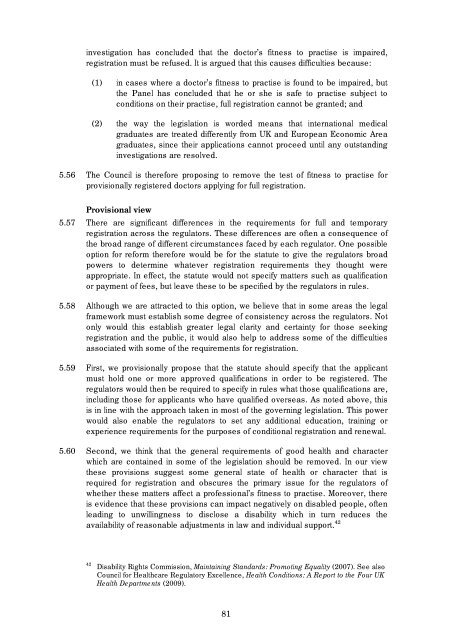Regulation of Health and Social Care Professionals Consultation
Regulation of Health and Social Care Professionals Consultation
Regulation of Health and Social Care Professionals Consultation
You also want an ePaper? Increase the reach of your titles
YUMPU automatically turns print PDFs into web optimized ePapers that Google loves.
investigation has concluded that the doctor’s fitness to practise is impaired,<br />
registration must be refused. It is argued that this causes difficulties because:<br />
(1) in cases where a doctor’s fitness to practise is found to be impaired, but<br />
the Panel has concluded that he or she is safe to practise subject to<br />
conditions on their practise, full registration cannot be granted; <strong>and</strong><br />
(2) the way the legislation is worded means that international medical<br />
graduates are treated differently from UK <strong>and</strong> European Economic Area<br />
graduates, since their applications cannot proceed until any outst<strong>and</strong>ing<br />
investigations are resolved.<br />
5.56 The Council is therefore proposing to remove the test <strong>of</strong> fitness to practise for<br />
provisionally registered doctors applying for full registration.<br />
Provisional view<br />
5.57 There are significant differences in the requirements for full <strong>and</strong> temporary<br />
registration across the regulators. These differences are <strong>of</strong>ten a consequence <strong>of</strong><br />
the broad range <strong>of</strong> different circumstances faced by each regulator. One possible<br />
option for reform therefore would be for the statute to give the regulators broad<br />
powers to determine whatever registration requirements they thought were<br />
appropriate. In effect, the statute would not specify matters such as qualification<br />
or payment <strong>of</strong> fees, but leave these to be specified by the regulators in rules.<br />
5.58 Although we are attracted to this option, we believe that in some areas the legal<br />
framework must establish some degree <strong>of</strong> consistency across the regulators. Not<br />
only would this establish greater legal clarity <strong>and</strong> certainty for those seeking<br />
registration <strong>and</strong> the public, it would also help to address some <strong>of</strong> the difficulties<br />
associated with some <strong>of</strong> the requirements for registration.<br />
5.59 First, we provisionally propose that the statute should specify that the applicant<br />
must hold one or more approved qualifications in order to be registered. The<br />
regulators would then be required to specify in rules what those qualifications are,<br />
including those for applicants who have qualified overseas. As noted above, this<br />
is in line with the approach taken in most <strong>of</strong> the governing legislation. This power<br />
would also enable the regulators to set any additional education, training or<br />
experience requirements for the purposes <strong>of</strong> conditional registration <strong>and</strong> renewal.<br />
5.60 Second, we think that the general requirements <strong>of</strong> good health <strong>and</strong> character<br />
which are contained in some <strong>of</strong> the legislation should be removed. In our view<br />
these provisions suggest some general state <strong>of</strong> health or character that is<br />
required for registration <strong>and</strong> obscures the primary issue for the regulators <strong>of</strong><br />
whether these matters affect a pr<strong>of</strong>essional’s fitness to practise. Moreover, there<br />
is evidence that these provisions can impact negatively on disabled people, <strong>of</strong>ten<br />
leading to unwillingness to disclose a disability which in turn reduces the<br />
availability <strong>of</strong> reasonable adjustments in law <strong>and</strong> individual support. 42<br />
42 Disability Rights Commission, Maintaining St<strong>and</strong>ards: Promoting Equality (2007). See also<br />
Council for <strong>Health</strong>care Regulatory Excellence, <strong>Health</strong> Conditions: A Report to the Four UK<br />
<strong>Health</strong> Departments (2009).<br />
81
















